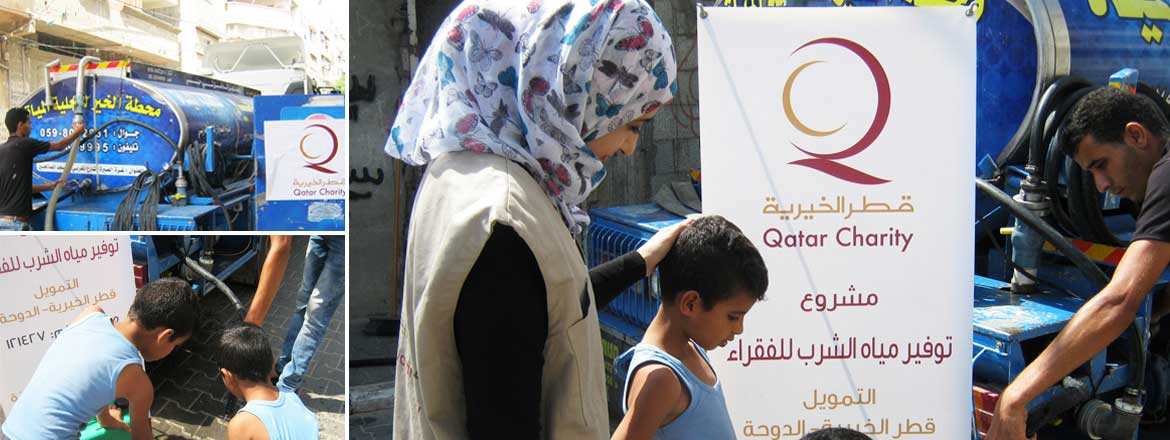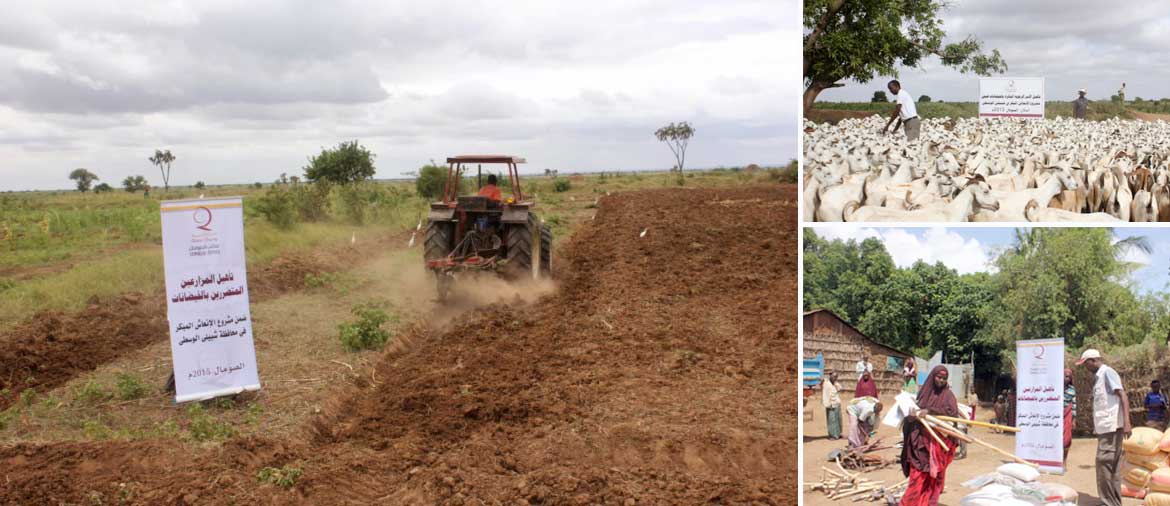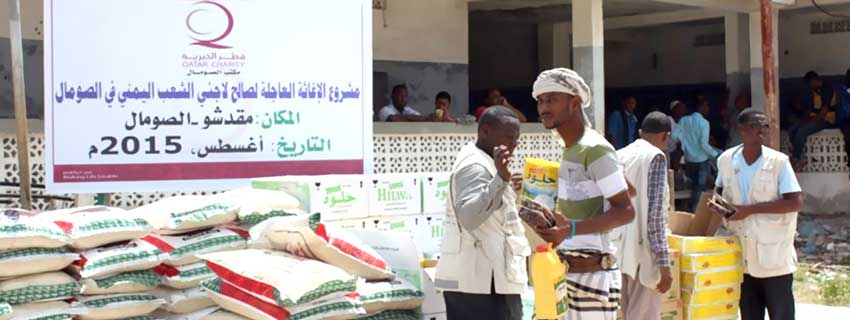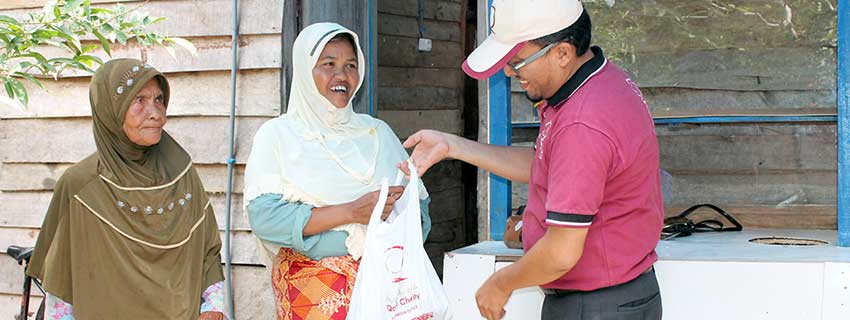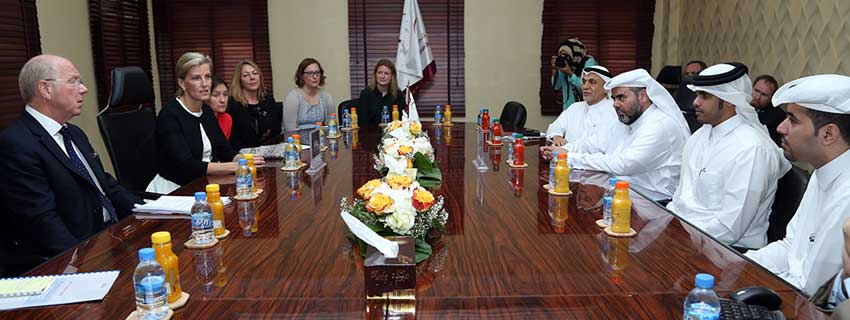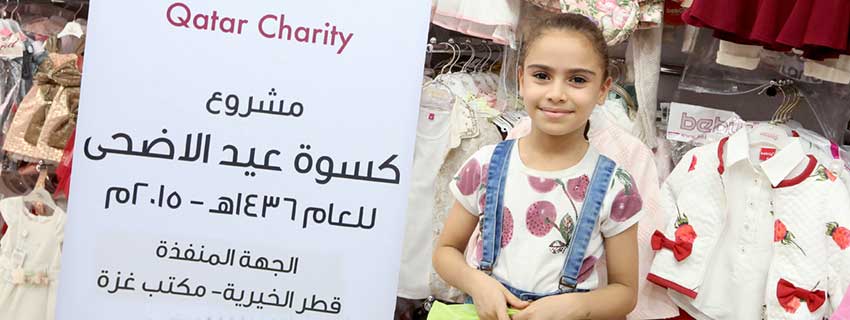QC Implements an Urgent Relief Campaign for the Affected by Chapala Cyclone in Yemen
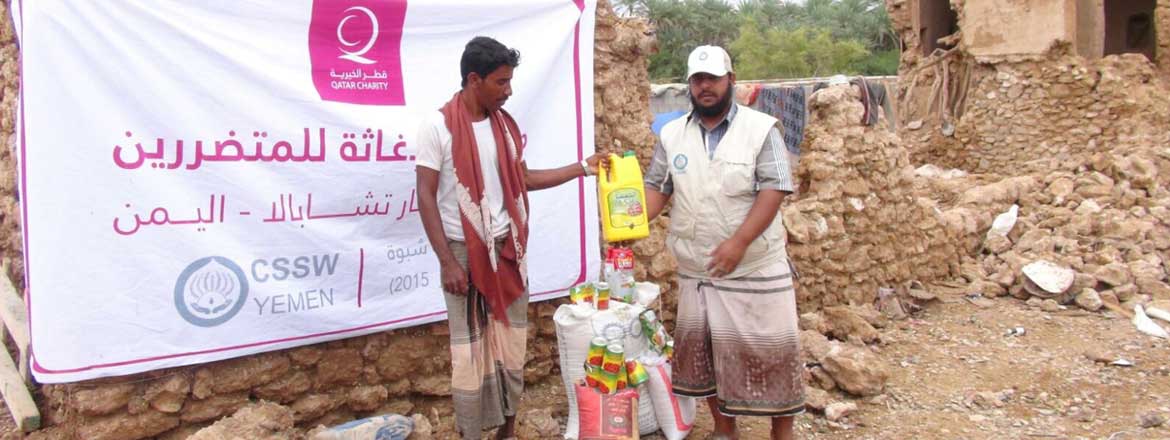
2015-11-16T02:19:40+01:00

- QC the first charity society to reach the people affected by the Chapala Cyclone in Socotra and other Yemeni cities. It was able to relieve 3,000 affected.
The first charity society that reaches the cities where the cyclone hit, QC was able to implement an urgent relief campaign from which 3,000 people benefited. QC’s field team is currently assessing the situation and evaluating the damages as to prepare for another relief campaign soon. The coming campaign is meant to offer aids and to rebuild what’s been destroyed.
Since last Saturday, the campaign’s been in effect. 500 families which were affected by the cyclone in Socotra, Hadramaut, Al Mahrah, and Shabwah received aids.
QC has distributed food baskets to all the families which were affected. Each basket had supplies sufficient for a month such as flour, rice, sugar, cooking oil, baby milk, legumes, and others. In addition, the families received 4 blankets,4 mattresses, 4 pieces of clothes for children and kitchen tools.
As QC’s team is currently evaluating the damages the cyclone left, QC’s other teams are offering aids to the affected by Chapala Cyclone in the island. QC is working in cooperation with local organizations as a first step to launch an urgent relief campaign that includes distributing relief supplies and reconstruction plans.
Engineer Rashid bin Fatis Al Mari, QC’s Director of Relief, said that QC’s immediate response reflects its commitment to its humanitarian duty towards the Yemeni people. Unfortunately, they are suffering from the aftermath of war and natural disasters. “QC was the first charity society to respond and offer aids to the Chapala-cyclone affected. It has a well-prepared team that is trained to respond to disasters,” said he and expressed his hope that such aids would help alleviate the sufferings of the affected.
According to some reports, 15 people died; two of which were women and other two were children; and 2 went missing in the Megh Cyclone which hit Socotra. In addition, 500 houses were entirely destroyed while 3,000 houses were partially damaged because of the Chapala and Megh Cyclones which hit the island in less than two weeks. The statistics show that 10,000 people are currently displaced because of them. The cyclones were also responsible for uprooting hundreds of palm trees and the death of thousands of cattle, the loss of hundreds of fishing boats and the destruction of electricity columns and communication lines.
Furthermore, 840,000 people benefited from QC’s aids set aside for Yemen during 2015 because of the ongoing crisis there. The aids were distributed at a cost of 21,500,000 QR. They included foodstuffs, homes, shelters, blankets, cleaning tools, health projects, ambulances, medical supplies, and education projects.
You can donate to support such projects through the link: Click here
Related News
QC Implements ‘Providing Drink
Through its office in the Strip and in cooperation with Ghaith for Relief and Development, QC has recently started implementing ‘Providing Drinking Water’ project to the poor. More than 3,000 poor families are expected to benefit from it. It will take around 8 months for the project to be implemented at a cost of 262,000 QR.
Kidney Diseases
The Municipalities in the Strip provide the citizens with salty water only, which could cause many different diseases such as kidney diseases. Therefore, QC decided to implement this project in order to provide the poor families with good drinking water.
Eng. Mohammed Abu Halloub, QC’s Office Director in the Strip, said that this project is being implemented because QC wants to alleviate the sufferings of those who cannot afford to get good drinking water, and to prevent the diseases spread because of water pollution. He also emphasized the fact that water projects are on the top QC’s priorities’ list since the siege and the attacks on the Strip have destroyed all of the water networks, which were not even sufficient.
QC, as he also mentioned, will not spare an effort until it has helped the needy families and offered a good living opportunities for the needy; whether through relief or development projects.
Water Crisis
The Strip’s aquifer is both polluted and empty which made the Strip suffer from a dire water crisis. As a result, the Gazan families who are financially stable buy filtered water, while the poor families still use the brackish water provided by the municipalities.
To help face this crisis, QC is implementing a project to filter rainwater and to inject it into the aquifer in around 30 public schools.
The UN had already warned from the worsening situation of water in the Strip. According to the UN’s report, if the current conditions remain the same, the situation in 2016 will be catastrophic. The Strip is in great need for desalination plants a hundred times more than roads.
Reconstruction of Gaza
After all the destruction and wreckage the last aggression on the Strip caused, QC spared no effort to help rebuild the Strip.
More than 2,000 people were martyred during the aggression, 11,200 were injured, and thousands of families, whose houses were demolished, were displaced. Furthermore, many infrastructure facilities such as roads, hospitals, schools, and factories were destroyed.
The last brutal attack on the Gaza Strip caused the loss of so many people, houses, and facilities. 2,139 were martyred: 579 of them were children, 264 of them were women, and 102 were elders. 11,200 people were injured: 25% of them became handicapped. 1,000 children became permanently disabled. 2,088 women, 3,374 children and 410 old people were injured. 1,200 families lost their breadwinners. 90 families were entirely eliminated and 49 massacres were executed.
In addition, 466,000 citizens were displaced, 2,360 houses were completely destroyed, 13,644 houses were partly destroyed, 30,000 workers lost their jobs, and 134 factories were completely demolished. The destruction of Gaza cost a financial loss of 3,500,000,000 USD.
You can donate to support such projects through the link: Click here
QC Implements Tens of Qualitat
- Hundreds of goats were distributed to the people to help them start over.
- Tens of hectares were restored for 250 families whose lands had been flooded.
As part of its early relief program to the victims of floods in the Middle Shebelle governorate in Somalia, QC implemented qualitative income-generating projects from which 400 families of the same governorate benefited.
Rehabilitation:
The projects included rehabilitation of the affected families and improvement of their life quality, in addition to supporting agriculture and shepherding. The program also included funding income-generating projects. For example, 750 goats were distributed to 150 families. Each family received 5 goats. This project was to enable them to get their ordinary lives back after the floods. The project also aimed at supporting shepherding and providing these families with a source of income that matched their previous professions.
QC has also restored agricultural lands in a total area of 250 hectares for 250 families who had worked in farming before the floods damaged their lands.
QC seeks to rehabilitate the agricultural and shepherding societies and start agricultural and shepherding businesses by supplying the workers with seeds and pesticides as well as manual cultivation instruments needed for local production. QC also helps them in their farmland restoration, and irrigation canals’ reformation. The program also supplied them with some cattle.
Terrible Immigration
The regions adjacent to the two rivers of Shebelle and Juba witnessed heavy rains in last October and November which led to the flooding of the rivers and caused a disastrous immigration of the inhabitants of the rivers’ banks. Middle Shebelle was mostly affected as most irrigation canals and flood control systems were damaged along the Shebelle River by these floods. Reports show that about 10,000 of the local inhabitants left their flooded cities, villages, and farms.
The objective QC had of the early relief project was to reach the local affected community in the governorate as it helped rehabilitate them in their crafts and professions. QC’s goal was to enable them to increase their daily income and enhance their life quality through a number of strategic projects including shops, production machinery, animals, and farmland restoration. This should facilitate their future confrontation to yearly floods. This project also seeks to restore artesian aquifers, reform schools and damaged clinics to help 93,000 people living in the region.
Tens of Thousands Beneficiaries
It is worth mentioning that QC has recently implemented various projects in Somalia including education, health, building mosques, and funding income-generating projects. Tens of thousands of Somalis around Somalia benefited from these projects. Of its construction projects in Puntland, QC inaugurated the reformation of 2 health centers and 2 preliminary schools at a cost of about 292,000 QR.
QC inaugurated the opening of 9 mosques, and 8 centers for memorization of Qur’an in 3 provinces in the north of Somalia: 3 mosques in the coastal province, 3 others in Burco, 1 in Awdal, and 2 in Hiran and Banaadir. It also built 8 centers for Qur’an memorization in Hiran, Banaadir, and Hargeisa. Thousands of Somalis shall benefit from these mosques and centers.
QC office in Somalia has also organized events of distributing sewing machines to 65 productive families in Mogadishu and Hargeisa city in Somaliland in cooperation with Jedoon Association for Woman and Child Development in Hargeisa and HINNA association in Mogadishu.
You can donate to support such projects through the link: Click here
QC Implements Relief Projects
- The aids are sufficient for the refugees and returnees for a month
- Members of the Somali Parliament and Representatives of the Yemeni community contributed in the distribution
Through its office in Somalia and as part of its relief campaign “Yemen, We are With You”, QC implemented an urgent relief project which targeted 600 families of the Yemeni refugees in Somalia and some of the Somali returnees from Yemen who are living in Mogadishu, Hargeisa, and Bosaso.
The food baskets, distributed to the beneficiaries, were sufficient for a whole month. Each family received 25 kg of rice, 25 kg of flour, 15 kg of sugar, 3 liters of cooking oil, 2.5 kg of powder milk, and 2 kg of dates.
Prominent Figures
Many prominent figures took part in the distribution of the aids to the people, including some members of the Somali parliament, and the representatives of the Yemeni community in Somalia. They all commended QC’s role in helping the Yemeni and Somali peoples.
This is one of so many other projects in which QC continues to fulfill its role in aiding and helping others. In addition, QC always makes sure that its beneficiaries are the neediest. The Yemeni people are suffering from a dire crisis which forced the families to emigrate and ask for asylum. This, of course, left the families without any living necessities.
Although Somalia is suffering from hard conditions and security issues, it became one of the countries which received the Yemeni refugees. Therefore, it is now the responsibility of those who work in charity and humanitarian fields to strengthen their efforts so that Somalia does not suffer from a critical condition, too.
130,000 Beneficiaries
130,000 beneficiaries benefited from QC’s continuous campaign ‘Yemen, We Are with You’ since the recent Yemen crisis started and until the end of last May (2015).
The food aid included 17,300 food baskets, 80 tons of flour, and 180 tons of different types of food which were distributed to the different governorates. Furthermore, 3 kitchens were prepared and equipped with foodstuff to provide daily fresh meals for 1,000 persons. Regarding healthcare, the hospitals of Aden, Ma’rib, and Taiz were supplied with some equipment, 100 first-aid bags, and a large amount of medications, and medical disposables.
In addition, 8 water tanks were distributed in Aden with the capacity of 1,000 liters. QC also distributed hundreds of mattresses and blankets to the displaced families there. Another project was funded to clean Aden Municipality in cooperation with its workers.
Call for Help
It is worth mentioning that when the Yemeni crisis started, QC appealed for help to provide 1,260,000 conflict-affected people with food, and medications.
After its appeal and as a first step, QC launched its campaign ‘Yemen, We Are with You’ to collect 36,500,000 QR (10,000,000 USD) to urgently deliver these humanitarian aids to the most affected categories.
QC also supervised the distribution of aids which Qatar sent to the people of Yemen. The aids were delivered through an air bridge from Doha to Djibouti–Ambouli International Airport following the instructions of his highness Sheikh Tamim bin Hamad Al Thani, God bless him. The aids were delivered over two days; there were 4 airplanes which carried 240 tons of different materials.
The aids were received by a delegation of QC which included Mr. Ibrahim Ali Abdullah, QC's Relief Department Director, and Mohammed Wa'i, QC's Office Director in Yemen.
QC’s field team was able to aid many conflict-affected families since the crisis first started in Aden and other Yemeni cities. They provided the families with food, drugs, and medical disposables. They sent the medical supplies to the hospitals so that they would treat the injured. The team also provided the families with food baskets and other basic and necessary items.
You can donate to support such projects through the link: Click here
1,000,000 People Benefit from
- 43,200 conflict-affected in Syria, 4,200 orphans’ families in Gaza, 120,000 people from different countries benefited from ‘Your Sacrifice, their Eid’ campaign
- El Kuwairi: “We thank the Qatari people for donating to our sacrifices project which made the needy of 52 countries the world over happy
Around 1,000,000 people benefited from the sacrifices campaign for the year 1436 AH which QC implemented and called ‘Your Sacrifices, their Eid’ at a cost of around 14,000,000 QR.
Mr. Youssef Bin Ahmed El Kuwairi, QC’s CEO, expressed the relief he felt because the sacrifices project was successful. QC implemented this campaign with the help of its partners in 52 countries from around the world, including Qatar. It was able to make so many needy and low-income families, who could not provide their children with meat, happy.
The affected who suffered from exceptional circumstances were prioritized such as the Syrians inside Syria, the Syrian refugees in the neighboring countries, the Gaza Strip, Yemen, Somalia, etc.
El Kuwairi said, “I am mostly thankful to those who donated for this project in Qatar, and I pray Allah that He accept their good work and reward them. Most certainly, their donations were the reason behind making the needy happy and achieving social teamwork in Qatar.”
QC had already distributed more than 28,300 sacrifices during the season, which meant 500 tons of meat in 52 countries. More than 43,200 families inside Syria benefited from the project. It was implemented in Damascus and its countryside, Idlib and its countryside, Al Rastan, Al Houla and Talbiseh in the countryside of Aleppo, in the countrysides of Hama, of Lattakia, of Daraa, and Quneitra. In addition, 4,200 orphans’ families from the Gaza Strip and 120,000 Somalis benefited from the project.
Other countries in which the project was implemented:
Palestine, the Palestinian camps abroad, Iraq, Jordan, Qatar, Tunisia, Morocco, Lebanon, Sudan, Rwanda, Uganda, Malawi, Burundi, Kenya, Ivory Coast, Djibouti, Tanzania, Mali, Togo, Nepal, India, Chad, Central Africa, Angola, Guinea Bissau, Mauritania, Yemen, Bangladesh, Benin , The Gambia, Namibia, Lesotho, Sri Lanka, Niger, Nigeria, Sierra Leone, Liberia, Congo, South Africa, Ethiopia, Burkina Faso, Senegal, Pakistan, Kyrgyzstan , Indonesia, Kosovo, Comoros Islands, Albania, the Philippines, Ghana, Bosnia, Ethiopia, and Georgia.
QC inaugurated a special campaign for pilgrimage and Eid Al Adha for this year (1436 AH). It included distributing the sacrifices inside and outside Qatar, giving people the chance to perform substitute Hajj, and distributing Eid clothing. Tens of thousands of people will benefit from this project.
The project was also implemented inside Qatar on the third and fourth days of Eid Al Adha. 2,500 sacrifices were distributed from which 12,000 people benefited, including 668 sponsored families with limited income.
Some of the Qatari volunteers helped in the distribution. In addition, QC, for the first time, offered delivery service using refrigerated cars. The sacrifices were given to the beneficiaries at their homes in Khor, Al-Shahaniya, Industrial Area (Sanaiya), and other areas inside Qatar.
This project also targeted the orphans’ and the low-income families, the indebted, the laborers, the divorced, Ramila Hospital’s inpatients, the laborers, courts, the bank, the mail, Al Qahira School, Al Cilia territory, and Abu Hamur territory and the Indian, Egyptian, Yemeni and Philippine communities.
You can donate to support such projects through the link: Click here
Qatar Charity and Orbis UK Lau
Qatar Charity and Orbis UK have launched a campaign to raise more than QR 4 million to reduce blindness in children in Bangladesh.
The campaign was launched after Her Royal Highness Princess sophie Rhys-Jones, the Countess of Wessex paid a visit to Qatar Charity headquarters in Doha.
Under this partnership, Qatar Charity will mobilize support for the campaign, while Orbis UK will implement it, by virtue of its more than 15 years of preventing blindness experience in Bangladesh.
Director of the Middle East Partnerships at Orbis UK Florence Brancheau said, "We are pleased for our partnership with Qatar Charity in this campaign to collect urgent donations that can help to transform the lives of children living in Bangladesh." She expressed hope that the Qatari people would back this campaign to save sight of the children in Bangladesh.
For his part, Qatar Charity CEO, Yusuf bin Ahmed Al-Kuwari expressed Qatar Charity's pride to implement this campaign with Orbis UK, saying this comes in line with Qatar Charity 's desire to enhance meaningful cooperation and strategic partnerships with international humanitarian institutions to implement high quality specialist programs across the world .
Al-Kuwari expressed his hope that this campaign would open the door wider for cooperation between the two parties.
QC Implements ‘Kiswit Eid’ (Ei
- QC focused on the countries suffering from exceptional circumstance such as Palestine, Syria and Yemen
- El Kuwairi, “‘Kiswit Eid’ project aims at making the orphans happy, especially that it’s Eid”.
In 33 different countries, 1,750 orphans enjoyed the Eid and became more hopeful for a better future thanks to Rofaqa initiative, one of QC’s initiatives.
This project is one of so many others which QC works hard to implement so as to bring joy and happiness to the hearts of its sponsored children in Eid Al Adha.
Love & Care
Countries which suffer from exceptional circumstances were focused on such as Palestine, Syria and Yemen. These countries’ orphans need all the love and care one can possibly offer. They suffer every single day that any ray of hope could be very useful to them.
However, QC did not forget about the orphans elsewhere. It’s project was implemented in India, Jordan, Philippine, Bangladesh, Lebanon, Iraq, Pakistan, Sri Lanka, Nepal, Indonesia, the Comoros, Kyrgyzstan, Ethiopia, Nigeria, Mauritania, Kenya, Morocco, Chat, Mali, Benin, Burkina Faso, Senegal, Ghana, Togo, Niger, Bosnia, Albania, Kosovo, Sudan and Tunisia.
‘Eid Clothing’ campaign covered the orphans’ different needs. It included getting them shoes, and presents (based on their age and gender): shirts and pants for the boys, and dresses and shoes for the girls. More than 550 orphans benefited from the project.
Values of Mercy
Mr. Youssif Bin Ahmed Al Kuwairi, QC’s CEO, said, “We, at QC, made sure to prioritize the orphans, and pay extra attention to them. QC does its best to provide them with the necessary care they need. Plus, we all know that the reward our religion promises to those who sponsor orphans is great.”
He, then, added, “‘Eid Clothing’ initiative is only a means to compensate for their loss. Yes, it is not like parental love and care; however, QC works hard to make the orphans feel like they’re a part of something, a family. We know how important it is to stand by these orphans’ side; which is why supporting them is a priority.”
Through its ‘Rofaqa’ initiative, QC inaugurated ‘Eid Clothing’ campaign for the benefit of its sponsored orphans. The number of sponsored orphans from 31st of December 2013 until today reached 39,057 orphans from 35 different countries the world over.
Similar Projects
At the same time QC implemented ‘Eid Clothing’ project, it implemented ‘Your Sacrifice, their Eid’ campaign. Through this campaign, QC was able to provide 28,100 sacrifices (of bulls and sheep) in 54 countries in Asia, Africa, and Europe at a cost of 13,560,000) QR.
As for the Hajj season, QC implemented many projects which included ‘Substitute Hajj’, ‘Feeding Pilgrims’ and ‘Grouping Pilgrims’. Thanks to QC, 1,500 pilgrims performed substitute hajj at a cost of 5,700,000 QR. It also grouped 16 pilgrims at a cost of 152,000 QR and provided 25,000 meals for the pilgrims.
Comprehensive Care:
QC sponsors around 80,000 orphans from 35 countries. It offers them comprehensive care which includes education, health, shelter and other basics.
‘Rofaqa’ Initiative is a unique humanitarian initiative which is interested in helping orphans worldwide. It aims at reaching a complementary level of care for children and orphans. It wishes to offer a new vision based on comprehensive care to include social, educational, health and psychological aspects. ‘Rofaqa’ initiative, which was inaugurated in December 2013, was able to sponsor 39,057 orphans so far.
You can donate to support such projects through the link: Click here
